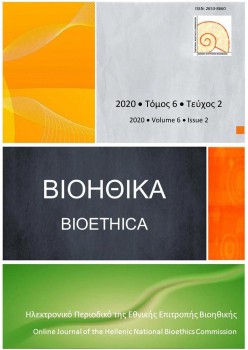The reconnection with a deceased loved one through virtual reality. Opinions and concerns against an unprecedented challenge

Abstract
A team of documentary producers and computer programmers, while they were in a laboratory creating a virtual reality environment, could never have imagined how much impact their project would have not only to the family involved but also to a large percentage of humanity and other scientific fields. In particular, they created a virtual park and a virtual girl, who in real life had died, and, through the special equipment, they placed the living mother in this environment. The mother ‘‘met’’ her daughter, ‘‘touched’’ her, ‘‘talked’’ to her, they celebrated her daughter’s birthday together’’ and, at the end, they ‘‘said goodbye’’ to each other.
This endeavor was the result of a combination of techniques and elements of various sciences. Of course it is admirable, but at the same time it raises doubts, intense concerns and many questions such as: ‘‘What are the limits of the technological applications?’’; ‘‘What aspects and at what extent of the human existence can they involved?’’; ‘‘How is the human existence affected?”; Can an application play with human emotions and, specifically, with the pain and misery of a human, in this case of a mother mourning her child?’’ The issue is difficult and even more difficult the moral and bioethical dilemmas that arise.
All the above-mentioned will be presented and studied in this present article. In particular, initially reference will be made to the definition of virtual reality, to the means which lead to the achievement of a completely operational system, as well as to the areas of application of its systems. Therefore, the way of creation and the context of the documentary will be presented, to be followed by a very short reference to the thoughts that the mother of the girl had expressed. Afterwards various opinions will be presented, questions and dilemmas arising by the documentary will be mentioned and commented and alongside some questions will be asked for reflection. The conclusions will complete this present article.
Article Details
- How to Cite
-
Nikolaou (Νίκη Νικολάου) N. (2020). The reconnection with a deceased loved one through virtual reality. Opinions and concerns against an unprecedented challenge. Bioethica, 6(2), 52–64. https://doi.org/10.12681/bioeth.24851
- Section
- Original Articles

This work is licensed under a Creative Commons Attribution 4.0 International License.
Authors who publish with this journal agree to the following terms:
- Authors retain copyright and grant the journal right of first publication with the work simultaneously licensed under a Creative Commons Attribution CC BY 4.0 License, which allows for immediate free access to the work and permits any user to read, download, copy, distribute, print, search, or link to the full texts of articles, crawl them for indexing, pass them as data to software, or use them for any other lawful purpose. Appropriate credit must be given by citing the author(s) and the original publication in this journal.
- Authors are able to enter into separate, additional contractual arrangements for the non-exclusive distribution of the journal's published version of the work (e.g. post it to an institutional repository or publish it in a book), with an acknowledgement of its initial publication in this journal.
We encourage authors to deposit their articles, as well as data underlying the publications, in institutional and/or other appropriate subject repositories.
Bioethica permits and encourages authors to archive the final publication pdf in institutional (e.g. the repository of the National Hellenic Research Foundation) or other appropriate subject repositories (e.g. SSOAR repository for social sciences), in compliance with institutional and/or funder open access policies, after publication in the BIOETHICA. Authors must provide bibliographic details that credit publication in the journal, as well as related funding details (when applicable).
Lists of institutional and other subject-based academic open access repositories can be found listed by country at the registry http://opendoar.org/countrylist.php
If your institution does not possess a repository you may deposit a copy of your paper at no cost with www.zenodo.org , the repository supported for open access research in the EU by the European Commission, through the project OpenAIRE (www.openaire.eu )


